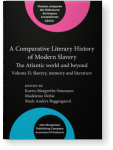Chapter 14
Carrying memory and making meaning
Black identity and the slave past
African American oral testimonies can profitably be considered as texts which complement
information drawn from archival materials. This chapter discusses orally transmitted memories of enslavement, and how
slave descendants make meaning of inherited tales of the slave experience. It is also argued that recently emerging
popular interest in genetics and ideas of bio-histories challenge historians of Atlantic slavery in new ways, as
everyday folk explore ideas ofblood instead of culture. This raises critical debates regarding the morality of
bio-social assertions of ‘truth.’ At the same time, the possibility of the body as mnemonic device is addressed, as
African descendants read their bodies as embodiments of historical processes that recall diverse geographies.
Article outline
- Orality in conversation with the archives
- The sailor, the mad woman, and the imagined diaspora
- The sailor
- The mad woman
- The imagined diaspora
- Written sources and oral histories
- The body as material evidence
- As archetype: The case of the “Mandingo”
- The genetic record: History and memory meet material determinism
- Conclusion
- Author queries
-
Notes
-
References
This content is being prepared for publication; it may be subject to changes.
